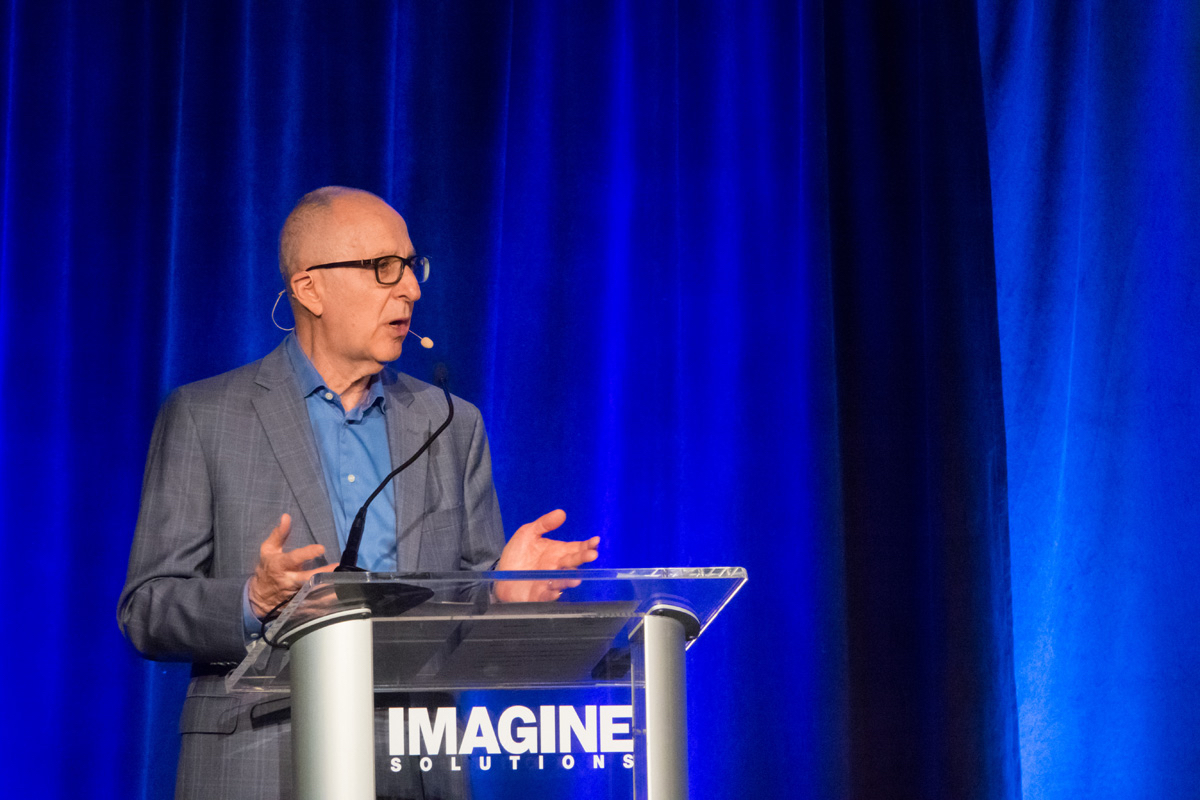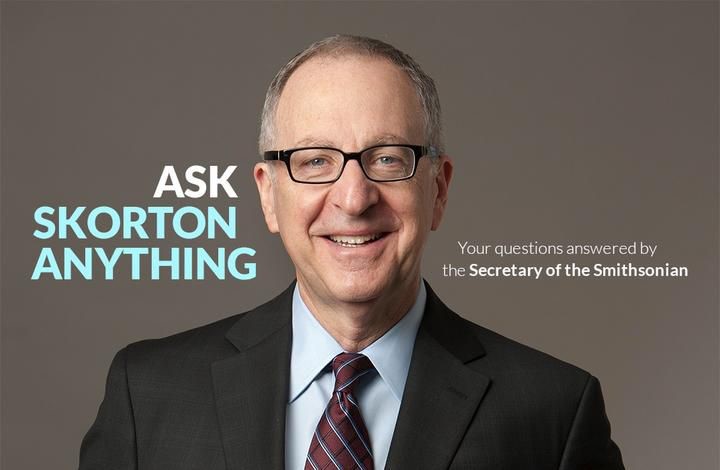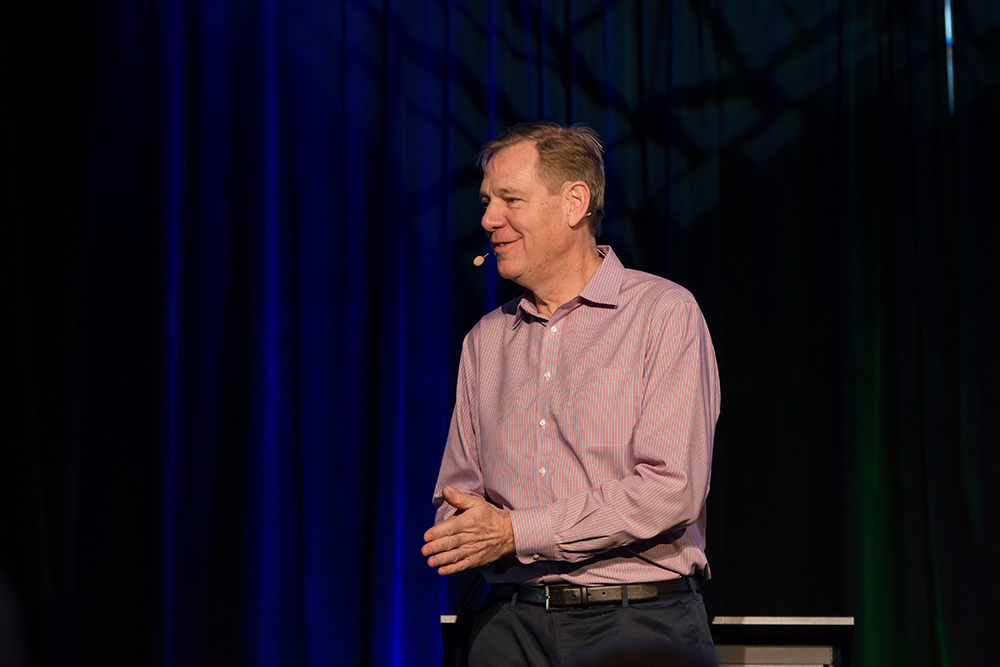Restoring Trust in Institutions
The focus of the Smithsonian is immersion in American’s cultures, science, history, and art. The national collections include more than 155 million objects of all kinds. There are 216 museums throughout the United States and territories that affiliate with the Smithsonian. A true national treasure, the Smithsonian institutions are essential in furthering an understanding of the past, but also of where we are right now, and where we are going, contributing to important public conversations about our nation’s future. At a time when trust and open conversations have been eroded, the Smithsonian is a touchpoint – something we can see, feel, and believe in, a chance to learn and connect.
00.08
well good afternoon class when I say good afternoon class you have to either say good afternoon David if you know me or if you don't good afternoon your excellency let's try it again good afternoon class yeah there were a few too many David's in there but that's okay and thank you for that wonderful introduction and how's our host doing today isn't he doing a fabulous job just amazing really is and thank you for that very good imitation introduction rather and just a quick question to my colleague if I'm such a smart guy how come I live in Washington and many of you live in Naples anyway just one of those things well I understand that I'm here today as was just said as part of a focus on great institutions and today as you know we're in the presence right here in Naples of a great institution
01.00
named Randy antic can we take a minute to thank Randy for what he does for this meaning it for this community so with the Smithsonian as you know we spend a lot of time immersed in America's culture science history and art and when I say immersed I mean literally immersed our collection your collection the national collections now number 155 million objects and specimens no I have not seen them all we also have wonderful relationships with 216 affiliate museums throughout the United States and Puerto Rico and Panama including the wonderful artists Naples Baker museum right here in Naples Baker's closed right now because of an aftermath from OMA but it's on the way to to return to return to action now our museums combined with museums elsewhere and libraries and archives and cities small cities big
02.01
cities towns across America are very important to our understanding of our collective past but these institutions I believe can also play a very important a very effective role in advancing our understanding of where we are right now and in convening important public conversations about this nation's future that's what I want to talk about today and I want to start by talking about what I call a crisis in trust lately as I think and I bet you do as well about the great challenges that we face I often find myself thinking about things I got from people who came before me and especially my late father he was an immigrant from Russia and because of that perspective I think my father had what I would describe as an unshakable optimism in this country my dad believed in America he believed in the American people and even when he disagreed with
03.00
our elected leaders he believed deeply deeply in our democratic process in my younger days I wasn't always the optimist that I am today when I was in college and actively protesting the Vietnam War I would get pretty angry at politicians at people who didn't agree with me and with and at the injustice I saw at that time in the world but as my dad liked to remind me the people I considered to be irredeemable jerks had the same vote that I did and so the best thing he would say would be if I could sit down with them and engage in some sort of conversation and of course that wasn't always an option and even when it was I didn't always take my dad's advice but the older I got the smarter my dad got you know that phenomenon and I realized that he was right about this as so many things and the only chance we have to resolve our disagreements as a society and move forward is to start engaging in open dialogue and to do that
04.02
dialogue in good faith today however it's getting tougher and tougher to accomplish that out in the public square that marketplace of ideas as we like to think of it it's gotten hard even to hear each other above all the noise but the bigger worry as I see it is that we're talking past each other filtering out anyone who doesn't already agree with our point of view and if we're not listening to each other we're not learning from each other and if we're not learning from each other we're certainly not working with one another to develop more robust solutions to the tough tough thorny problems that we all face we're all familiar with these trends they're an inescapable part of life as we now live it now we're also pretty familiar with some of the causes apparently partisan media give people the ability to feel informed while often shutting out information that doesn't fit the particular worldview of whatever outlet it is and social media for all
05.02
the ways it can connect us has a tendency to create what people call echo chambers of like-minded family and friends and peers but there's more to it than this underlying all of it as I see it is what I call a crisis of trust many Americans are just no longer sure who or what to believe in anymore as you may know the company Edelman puts out a report every year that measures the public's trust in institutions across 28 countries it's called the Edelman Trust Barometer and the findings of this year's report which was released in January are staggering and troubling from 2017 to 2018 the American public's trust in four major institutions government media NGOs and business dropped by an average of nearly 10 points this represents the largest decline of the 28 countries surveyed and
06.01
today for the first time in the studies history each of these institutions that I named is trusted by less than half of the American public and while trusts and institutions fell across the United States population as a whole it may be of interest to you to know that the decline was steepest the decline in trust was steepest among the most informed Americans those with college degrees and those with substantial incomes in fact the survey found that when it comes to the informed people's trust in institutions the United States now ranks last of those 28 countries now democracy requires dialogue that might sound like a very abstract problem to some people but the loss public trust has real-world consequences and needs to be approached with the same sense of urgency that we approach the other issues that occupies as a nation let's say climate change education
07.02
inequities immigration healthcare the economy in fact we are not going to address those latter issues unless we as a society are able to restore some measure of trust some measure of faith in facts and some measure of openness to one another's perspective in a democracy the ability to engage in open and honest debate is absolutely positively essential now I wish I could claim this as a great insight of my own or even a recent insight but it goes all the way back to the very creation of democracy itself in his history of the Peloponnesian War Thucydides described the Athenian statesman Pericles view of democratic culture as follows instead of looking on discussion as a stumbling block in the way of action we think it an indispensable preliminary to any wise action at all well today so many
08.01
centuries later we have hit a stumbling block in the biggest debates of our time a growing number of Americans seem to prize intuition / accuracy feelings over fact and the result is that a proper debate in certain forms and uncertain topics has become seemingly impossible no I'm not totally naive I recognize that our discourse has never been perfect in this country or any country many Americans have been shut out of those discussions and many Americans over the generations have been denied a voice and I know that we cannot simply erase all of our disagreements but I don't think we want to erase those disagreements but we can try to understand the issues and understand one another better than it seems we do today for the sake of social progress we must do this and I believe we can do it and the question of course is how how can we build back that trust on that
09.00
understanding when the public sees so many sources of information as unreliable I believe that one part of the answer is found in America's museums and other cultural institutions now Edelman doesn't measure public attitudes toward museums specifically but other polls show that while the American people's trust in so many institutions have plummeted trust in museums and libraries remain high most Americans see these cultural institutions as honest brokers of information about history and on top of that they also see museums as honest brokers of information about science in fact a Pew survey last year found that people trust scientific information from museums more than they trust information from the media the government or any advocacy groups this confidence is a big part of the reason why museums continue to bring together millions and millions
10.00
of people all over the country despite our differences the Smithsonian stitute alone draws 30 million visits a year and that's just the Smithsonian overall museums in the u.s. attract 850 million visits a year or more than two visits every single day along with museums people in communities across the country feel great affection for their local libraries and archives and other local cultural institutions they feel welcome they feel comfortable and that gives these institutions incredible potential to serve as more than places that people visit to take in history art science and literature they can also be venues for inclusive conversations important depoliticize discussions of the challenges our country faces now we at the Smithsonian see this not only as a potential but as part of our responsibility and over just the last few years we've been convening
11.01
more and more of these kinds of conversations let me just describe some of the things that we're trying in the spring of 2015 the staff of our new National Museum of african-american history and culture more than a year before opening its doors responded to the protest that hit Ferguson Missouri the previous summer by holding a day-long symposium on race and reconciliation the symposium brought together journalists clergy artists academics and legal experts to explore the unbelievable challenges facing african-american communities and to discuss any ways that we might drive change this was a few months before I officially became secretary but the event had a big effect on me and really inspired me to think about the convening power of the Smithsonian and other such institutions and since then we've been looking hard and listening to the public for new ways to convene similar conversations for example in April of
12.01
last year the Smithsonian held our inaugural earth optimism summit over the course of three days on Earth Day weekend scientists philanthropists and activists of every stripe came together to talk about the boldest and most promising solutions to some of our most pressing problems as sustainability and conservation challenges including climate change habitat loss and food waste and last year we launched a new website called Smithsonian second opinion org I'm really excited about this site we use it to promote a more open and honest public debate on a variety of critical issues every three or four months I bring together a panel of people across the ideological spectrum to discuss a topic of national importance and national disagreement so far we convened a panel on climate change so far we convened two panel on immigration our next panel will cover the topic of does art matter we're even
13.02
getting a little experimental I don't mean experimental in the ways that some of us did in college I'm referring to a forum we hosted that's called the long conversation this concept if you haven't bumped into it begins with two people on a stage having a conversation that lasts about 15 minutes then one of them leaves in somebody else takes his or her place and this goes on for hours in our first trial we had to go for seven hours every seat was full for the whole 7 hours there's a hunger out there for ideas there's a hunger out there for engagement and we at the Smithsonian are trying to provide that engagement and while I'm very proud and excited about the role that we're playing I'm well aware that there's the limit to the impact that one single organization is going to have and if we want to really change the national discussion even a little bit we have to support similar efforts all over America at the local level everywhere as I said I believe
14.01
there's a hunger out there for thoughtful rational depoliticized discussion and isn't that why you have come to this conference now that we have to just replicate randy antic and create more of these across the United States and I mean that very sincerely not the part about replicating Randy that would be tough but the other part but actually we don't need to put all of this on one man's shoulders there's more than every single one of us every single one of you can do when you leave this conference and I'm going to ask you to do two things a call for action for two things number one if you're interested in any of the topics I mentioned take a peek at Smithsonian second opinion org write me a note tell me how we can make it better and we have a toolkit in every edition that could help you set up a local conversation about that topic if you wish and the second thing I ask you to do whatever issue you are most passionate about in your life in your
15.00
family's life in your community's life think about ways that you can convene a conversation about it in your community call a museum and ask them set up a town hall go to a library every day it seems we hear someone express a yearning an honest yearning for common ground' and how hard it is friends for us to find that common ground well these institutions that are right down the street from wherever you live these are common ground I'll meet you there we'll talk and we'll listen thank you very much [Applause]





